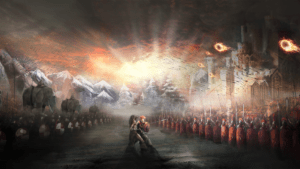The Foundations of Islām
According to Islāmic tradition,1 the Qurʾān contains the very words of Allāh, episodically revealed through Muhammad over the concluding 23-years of his life. Consequently, to understand Islam, one must consider the Qurʾān within the context of Muhammad’s life.2 Following this interpretative principle, Muslim leaders derive Sharia (Islāmic law) from a conjunction of the Qurʾān and hadith (records of Muhammad’s life and teaching), rather than the Qurʾān exclusively.3 Unfortunately, there is much difficulty in ascertaining the events of Muhammad’s life reliably. The most authoritative account appears in AD 870 (238 years removed from Muhammad’s death), and in creating this account, Ṣaḥīḥ al-Bukhārī draws from approximately 600,000 traditions—rejecting 98.8% (592,603) as inauthentic.4
By interpreting the Qurʾān within the accepted context of Muhammad’s life, one properly understands Islam as a religion of law, anti-Christian polemic, da’wah, jihad, “Islamized biblicist prophetology,” conquest, hijra, and apocalyptic expectation.5 Additionally, the word Islam (which means “submission”), reveals the foundations of the religion, conveying the fundamental doctrine that Muslims are to submit to Islam, Islāmic law, and the law of Allāh.6 Accordingly, the Muslim community is responsible for actively conducting jihad with the express intention of establishing a global Islāmic State (khilāfa), whereby submission according to the law of Allāh is a universal requirement.
The Life of Muhammad
Muslims often present Muhammad as a larger than life figure, above all reproach, perfectly exemplifying humanity and embodying ideal ethical standards.7 However, historical accounts of Muhammad’s life demonstrate his proclivity toward extreme violence, defying longstanding social conventions, and violating armistices.8 For example, within the ancient social landscape of Arabia, the True of God forbade all combat during the four sacred months. Desiring to achieve advantage against an unsuspecting enemy, Muhammad initiated early incursions against the Quraishites during the holy month of Rajab, intentionally violating the longstanding truce.
Upon receiving word that the operation was unsuccessful, Muhammad quickly installed new military leadership, desiring to conduct a subsequent attack against unscored convoys that would be traveling under the protection of the sacred month.9 In the wake of these actions, Muhammad expressly justified his action in the name of Allāh, thereby abolishing any adverse claims against his character. Nonetheless, Muhammad’s justification does not mitigate his motivation for conducting the raids in the first place, as it is apparent that his early military campaigns were unprovoked attacks, intending to cut off and capture Makkan caravans.10 As Muhammad began to experience success in these offensive operations, his military objectives began to evolve, shifting focus toward securing the Ka’ba as a place of worship, then to conquering Arabia, and ultimately in achieving Islāmic conquest of the world.
Following the conquest of the Bani Al-Mustaliq at the wells of Muraisi, Muhammad’s character is further accentuated as he permits his men to rape women captured during the campaign. Subsequently, Muhammad institutes regulations concerning women captured during military engagements. During the battle of Hunayn, Muhammad enacted the principle that capture ipso facto dissolves previous marriages, thereby allowing captors to exploit captured women—under the stipulation, they take precautions to avoid pregnancy.11 Through a holistic examination of Muhammad’s life, one finds that the self-proclaimed prophet continually acts deceptively, advocates rape, initiates unprovoked military raids, justifies assassination to obtain political power, exhibits cruelty towards enemies (even commanding the slaughtering prisoners), and commands the spread of Islam through physical coercion.
Early Islāmic Conquests
Contemporary Muslims in the West actively attempt to disassociate themselves from the violent heritage of Islam, asserting that the term jihad possesses an exclusively spiritual significance. However, this exemplifies the fallacy of “selective (hermeneutical) attention,” as Islāmic scholars recognize the primary use of jihad is militant by nature, defining the term as “holy war” or “warfare with spiritual significance.”12 While the Qurʾān does reference a non-violent, inner-struggle form of jihad (“greater jihad”), Muslim tradition recognizes a form of hermeneutical abrogation, where progressive revelation nullifies previously established doctrines. Accordingly, following passages advocating a violent jihad (“lesser jihad”) against the enemies of Allāh, nullify and replace earlier passages prescribing greater jihad.13
Upon examining Mohammad’s life, it becomes clear that violence was an inherent aspect of his character, as he exhibits violent outbursts, conducting several assassinations, committing brutal acts of torture, and executing defenseless prisoners of war.14 It was Mohammed’s belief that Allāh commissioned him to conquer the world and spread Islam. Accordingly, the goal of jihad is to conquer and dominate all non-Muslims.15 Consequently, jihad is a fundamental theological doctrine within Islam, allowing for extreme destruction and despotism. The Islāmic conquests (AD 632-732) clearly demonstrates the ramifications of this doctrine as Muslims slaughtered approximately 500,000 people over a four-year period (AD 634-638).16 These casualty counts are extremely high for this era, as evidenced by comparing the Islāmic conquests with the Christian Crusades. In over 200 years of warfare, the Christian Crusades resulted in approximately 1,000,000 casualties, whereas the Islāmic conquests produce the same number of victims in only a 10-year duration.17
By carefully examining the text of the Qurʾān within the context of Mohammad’s life, it becomes evident why Islāmic scholars would define the term jihad to mean militant warfare, with spiritual significance. Jihad—as a pillar of Islam—purposes to achieve world domination, ultimately conquering and dominating all non-Muslims peoples of the earth. Therefore, any intellectually honest student of Islam must equate jihad with offensive hostilities targeted against non-Muslims, and cannot legitimately represent Islam as a religion of peace.
Jihad, Martyrdom, and the End of the World
The violent history of Islam is undeniable, and one cannot understand Islam without first understanding the religion’s necessity to demonstrate worldly power and success.18 Inherent within the Islāmic traditions is the notion that Muslim fighters are to engage in jihad for the purpose of domination. Ṣaḥīḥ al-Bukhārī affirms this concept in stating, “Islam is to be dominant, never to be dominated.”19
Although jihad is a word that defies literal (or easy) translation, an accurate expression is, “war that one wages with the goal of achieving God’s favor or working His will upon the earth,” or “war as a spiritual exercise.”20 The Qur’an supports this definition of jihad, portraying a salvific covenant between God and man concerning fighting (cf. Surah 9:111).21 Additionally, the Verse of the Sword (Surah 9:5) constitutes the basis for a general waging of jihad and effectually abrogates all previous verses that contradict its mandate.22 Yazid b. Shajara of Madhhij exemplifies this tradition in saying, “The first drop of blood dripping from the sword brings forgiveness with it for every sin. . .”23
These traditions provide a primary motivation for Islāmic fighting in the ancient world, as Muslims would often fight to achieve redemption or to expiate sin. However, religious considerations were not the only motivation for fighting, as many Muslims obtained extraordinary wealth through their conquests, and the capture of prisoners became a primary means of financing the Muslim empire.24 Unfortunately, this mindset is not exclusive to ancient Islāmic traditions, as radical Muslims in the modern world actively embrace this same ideology. Deriving their theological principles from the Wahhabi sect, these Muslims actively seek to re-establish the caliphate.25 According to this view, there is only one true form of Islam, and those who are not actively supporting the establishment of the caliphate are not truly Muslim.26
Accordingly, suicide attacks or martyrdom operations are a crucial element of radical Islam, as the self-sacrificial nature of the attack demonstrates personal courage and ultimate commitment to Islam. Islāmic leaders actively utilize Surah 2:207 to encourage suicide bombings, placing suicide attackers in a more exalted category than other martyrs, by referring to the practice as “the pinnacle of the summit of jihad.”27 This indoctrination process forces moderate/nominal Muslims to choose between participating in jihad and joining the opposition.28
How Islam Plans to Change the World
Despite popular claims that Islam is a religion of peace, its fundamental doctrines pursue world domination, desiring to establish a worldwide Islāmic state (i.e., a Khalifah) ruled by a caliph (i.e., a single ruler).29 While not officially published as a strategy, Islam uses a four-pronged approach to achieve this desired end state. The first stage is Da’wah, which consists of aggressive evangelism campaigns, aimed at propagating Islam.30 The second stage, Jihad, involves striving in both spiritual and military aspects. The greater jihad is warfare against sin and all that is against Allāh and his teachings (i.e., an internal struggle to follow the will of Allāh), while the lesser jihad is traditional holy war, declared in the name of Allāh and used to spread his will.31 While not all Muslims are required to participate in lesser jihad, all are obligated to support the cause when it occurs.32
Presence and immigration provide the third and fourth prongs respectively. The presence strategy seeks to create a presence in a new area and expanding its sphere of influence from there. The construction of mosques in areas with low Muslim populations provides the support base necessary for further expansion via immigration and Da’wah efforts.33 Global statistics demonstrate the effectiveness of this model, as Islam is the fastest-growing religion in the world, and is now the second-largest (approximately 1.3-1.6 billion Muslims, or 20% of the world population).34 In fact, global projections indicate that by 2050, 50% of all people under age 21 will be Muslim.35
- This article is a précis of Joshua B. Lingel, Christian Apologetics to Islam (La Habra, CA: i2 Ministries, n.d.), and only intends to serve as an introduction to Islām.
- Joshua B. Lingel, “The Foundations of Islam,” in Joshua B. Lingel, Christian Apologetics to Islam (La Habra, CA: i2 Ministries, n.d.), 102.
- Ibid., 101.
- Ibid., 102.
- Ibid., 101.
- Ibid.
- W.H.T. Gairdner, “The Real Life of Muhammad,” in Joshua B. Lingel, Christian Apologetics to Islam, 105.
- Ibid., 107-108.
- Ibid., 108.
- Ibid., 111.
- Ibid., 108-109.
- Chester J. DeLagneau, “The Early Islamic Conquests,” in Joshua B. Lingel, Christian Apologetics to Islam, 232.
- Ibid., 232-234, 237-239.
- Ibid., 239-240.
- Ibid., 237-238.
- Ibid., 244.
- Ibid.
- David Cook, “Jihad, Martyrdom and the End of the World,” in Joshua B. Lingel, Islam’s Issues, Agendas, & the Great Commission (La Habra, CA: i2 Ministries, n.d.), 119-121.
- Quoted in David Cook, “Jihad, Martyrdom and the End of the World,” 118.
- David Cook, “Jihad, Martyrdom and the End of the World,”121.
- At-Tawbah (9):111 [Abdul Haleem Translation]: “Indeed, Allah has purchased from the believers their lives and their properties [in exchange] for that they will have Paradise. They fight in the cause of Allah, so they kill and are killed. [It is] a true promise [binding] upon Him in the Torah and the Gospel and the Qur'an. And who is truer to his covenant than Allah ? So rejoice in your transaction which you have contracted. And it is that which is the great attainment.” [Emphasis added]
- David Cook, “Jihad, Martyrdom and the End of the World,”121. At-Tawbah (9):5 [Abdul Haleem Translation]: “And when the sacred months have passed, then kill the polytheists [also translated pagans or idolaters] wherever you find them and capture them and besiege them and sit in wait for them at every place of ambush. But if they should repent, establish prayer, and give zakah, let them [go] on their way. Indeed, Allah is Forgiving and Merciful.” [Emphasis added]
- Quoted in David Cook, “Jihad, Martyrdom and the End of the World,” 122.
- David Cook, “Jihad, Martyrdom and the End of the World,”123-124.
- Ibid., 125-126.
- Ibid., 129.
- Ibid., 131. At-Baqarah (2):207 [Yusuf Ali Translation]: And there is the type of man who gives his life to earn the pleasure of Allah: And Allah is full of kindness to (His) devotees.
- David Cook, “Jihad, Martyrdom and the End of the World,” 132.
- William Wagner, “How Islam Plans to Change the World,” in Joshua B. Lingel, Islam’s Issues, Agendas, & the Great Commission (La Habra, CA: i2 Ministries, n.d.), 34, 36.
- For a detailed analysis of Da’wah, see Patrick Sookhdeo, Dawa: The Islamic Strategy for Reshaping the Modern World (McLean, VA: Isaac Publishing, 2014). Alternatively, for a basic précis of Dr. Patrick Sookhdeo's work, see Understanding Islam: Da'wah
- William Wagner, “How Islam Plans to Change the World,” 38.
- Ibid.
- Ibid., 40-41.
- Ibid., 33.
- Ibid., 42.




